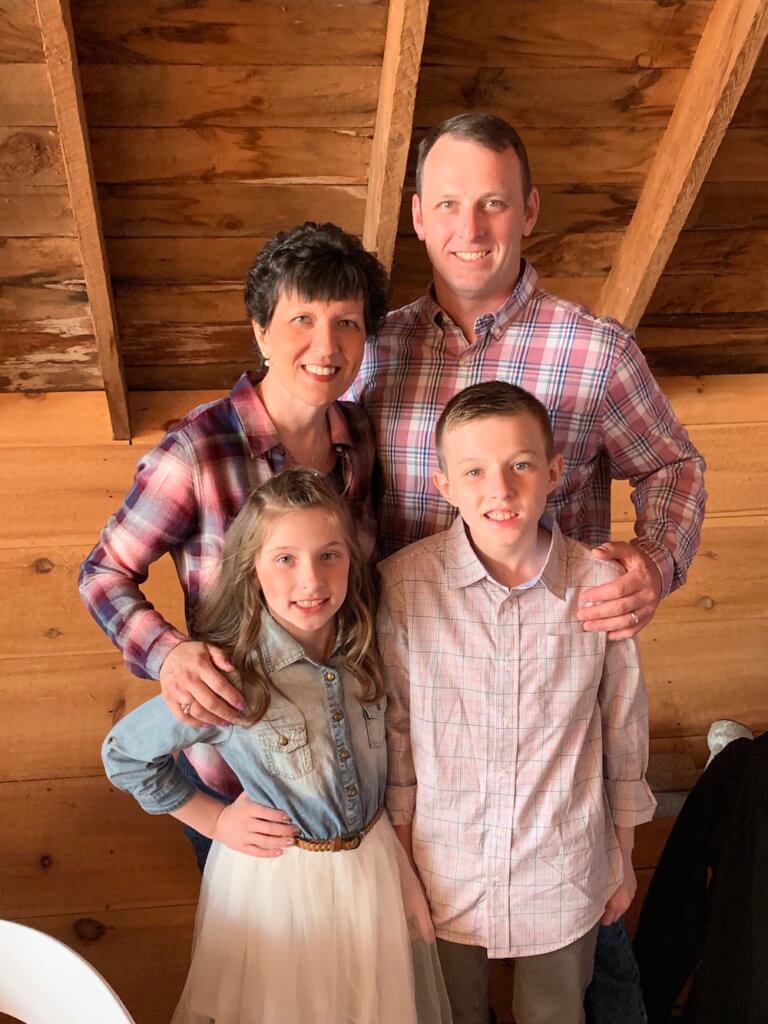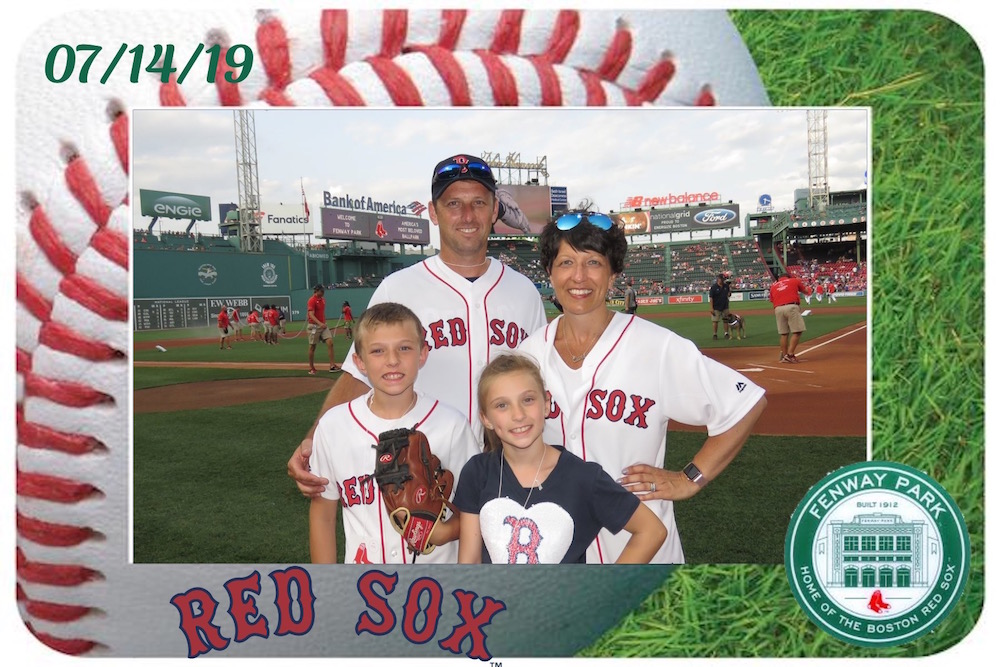On a sunny July afternoon, Michelle Lemieux ran onto the field at Fenway Park to throw out the ceremonial first pitch during a Boston Red Sox home game.
While the crowd of over 36,000 people continued to applaud as Lemieux ran back to her family, only a handful in attendance could truly appreciate what she had just accomplished.
A troubling discovery
In 2013, Lemieux, then 36, was diagnosed with HER2-positive breast cancer, meaning her cancer tested positive for the protein human epidermal growth factor receptor 2 (HER2).
She had first discovered a lump while scratching an itch, but because it was painless, she didn’t think much of it. When her family eventually convinced her to see her primary care physician, she was scheduled for a mammogram right away. The scan drew concern from her radiologist, who then ordered an ultrasound. This revealed both a suspicious lump in addition to an enlarged lymph node under her armpit.
An ensuing biopsy would confirm her doctor’s suspicions: Lemieux had breast cancer.
“I was devastated when I found out,” she recalls. “I mean, cancer? Are you kidding me?”

Lemieux was initially treated close to her hometown in Maine. She completed five months of chemotherapy, with a month off, and then had surgery to remove the tumor. Because of the cancer’s specific HER2 positivity, her treatment included the drug trastuzumab (also known as Herceptin), which works by attaching itself to HER2 receptors to potentially slow down or even stop the cancer’s growth.
Even during treatment, Lemieux found herself struggling to accept the news.
“I knew I was strong, but this was out of my hands. I was scared and worried about the future,” explains Lemieux. “I wanted to be strong for my children, so instead of bemoaning my fate, I always tried to find the positive so my children wouldn’t see me in fear.”
After breast surgery, Lemieux was found to have a complete response to the treatment, and by 2014, she was in remission.
A major setback
Lemieux remained in remission for over three years, but when she developed a persistent cough in October 2017, her family once again insisted she see a doctor. After undergoing a chest X-ray and a CT scan, Lemieux was surprised to be called back to the office that same day. The tests revealed lesions in both of her lungs: her breast cancer had returned and spread.
As her team discussed treatment options, Lemieux was encouraged to head to Boston to seek a second opinion. It was then she first met Nancy Lin, MD, director of the EMBRACE Metastatic Breast Cancer Program and the Program for Patients with Breast Cancer Brain Metastases at Dana-Farber/Brigham and Women’s Cancer Center (DF/BWCC). The two formed an instant connection and worked on creating a plan.
Splitting her treatment between the Susan F. Smith Center for Women’s Cancers at DF/BWCC and her local hospital in Maine, Lemieux started another round of chemotherapy. But just six months after beginning her new regimen, Lemieux began experiencing troubling symptoms. She had numbness in her hands and feet, and couldn’t control her right arm, describing it as having a mind of its own. After a brain MRI, she learned the cancer had metastasized to her brain, resulting in nine lesions.
“I was just absolutely devastated,” Lemieux says. “But every piece of bad news just puts me into fight mode. I refuse to let cancer get me.”
According to Lin, HER2-positive breast cancer patients who have a complete response to their initial treatment, like Lemieux, have a 90% cure rate. However, for patients whose cancer returns, roughly half will experience brain metastases. This aggressive form of the disease is not curable, although it can be treatable. In these instances, patients benefit the most from personalized treatment options.
This commitment to personalized care is one of the primary reasons DF/BWCC created the Program for Patients with Breast Cancer Brain Metastases. The program aims to improve treatment possibilities for patients and pair them with the right combination of specialists to optimize their quality of life.
Since undergoing brain surgery to remove one of the larger tumors in May 2018, Lemieux has received various treatments and currently receives a targeted therapy combination. For Lin, the goal is to always stay one step ahead of the cancer, effectively treating Lemieux’s current condition while also thinking about future treatment options, including clinical trials. It’s a balancing act that certainly does not go unnoticed by her patient.
“Dr. Lin always has a plan,” says Lemieux. “I am so blessed to be a patient here because I know I am in good hands.”
The pitch
In April 2019, Lemieux was offered the opportunity of a lifetime. During a local fundraiser event called the Heart of Hope Charitable Fund, which is held every year to raises funds to assist local men and women with breast cancer, Lemieux was invited onto the stage. She was handed a baseball before learning her family was going to a game between the Boston Red Sox and Los Angeles Dodgers — and she was going to throw out the ceremonial first pitch. Through tears, she thanked the organization and began preparing for the game.
Since the surgery, Lemieux has struggled with her fine motor skills and says her right arm is not as strong as it once was. Undeterred, she practiced throwing a baseball with her son, Cameron, and when it came time to throw out the pitch, she just let it fly.
“I didn’t worry about where the ball would go,” Lemieux laughs. “The whole experience was just amazing and something my kids will never forget.”

One day at a time
Lemieux says she tries to live in the moment and enjoy each day. While the setbacks are difficult, she says it’s important to stay positive and fight for the things that are important to you.
“She has no illusions as to what she’s up against, but she continues to live her life to the fullest,” Lin says. “She is really amazing and has so much to teach us all about living life in the face of uncertainty.”
“There isn’t one aspect of my life that cancer hasn’t affected,” Lemieux explains. “It would be easy to blame cancer for all it has taken from me, but instead I choose to be grateful for each day I have.”
Lemieux also notes that she could not have gotten through this without her close friends and family. She says she is forever thankful to her husband, children, and everyone else who has been there for her throughout her journey.
“For me, positivity is everything, and I try to live in the good — not the bad,” says Lemieux. “I have two kids I need to live for, and I refuse to give up. I am a survivor and my wish is that someday there will be a cure for cancer.”

Love you Michelle. Keep fighting girl!
God Bless You Michelle and continue to remain positive and as strong as you possibly can. I am an 11 year Breast Cancer survivor. My cancer was aggressive and I also was HER 2 Positive. I took 15 months of chemo and also took Herceptin. Thank God I am doing well and of course I pray every day that I remain this way. You are a true inspiration. I send my prayers to you and your family.